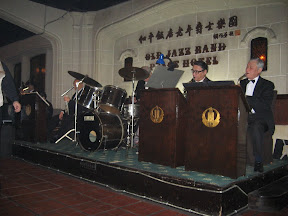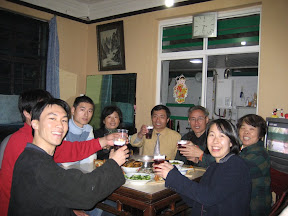Thrive after the cultural revolution

The cultural revolution and the misdeeds of the gang of four are deep wounds that the older generation of Chinese continue to nurse. I was told that many Shanghainese like to cook three male crabs and one female crab together to represent boiling Mao Zhedong, and his three cronies Zhang Chunqiao, Wang Hongwen, and Jiang Qing.
Nevertheless, as difficult as it was for the lost generation during the Cultural Revolution, they are alive and well, albeit slightly bewildered. Friday night, Michael, Christine and I went to the Peace Hotel (Wo Ping Fan Dian) to watch the Old Jazz Band play. All in their 70s and 80s, these musicians sport my grandfather’s quiet demeanor but play jazz music passionately. Can you imagine an old Chinese dude in a tux, all straight faced, shaking his hips and playing the maracas? Christine and I suspect that when these musicians were forced to do farm labor during the cultural revolution, they must have buried their instruments in a hole, only to dig them up in 1978 to regroup in the Peace Hotel, where they have been playing ever since.
On Saturday, my good friend, expert linguist and electrical engineer Jason Yang came from Tokyo to visit me. It’s his first time in Shanghai but along with the other ten languages that he knows, he picked up Shanghainese in the last week or so in order to reconnect with his grandmother’s brother’s family here. I was invited along for what turned out to be a six hour long feast in a very traditional home, where the Wu family has been living for the last fifty years. Behind a huge high rise on Jiangsu Lu, north of the French Concession, the Wu family lives in a two story home . . . with five other families. This is becoming more and more rare as the developers push into the last remaining traditional residential areas. In fact, the Wu family’s home is about to be bulldozed in the next six months, to make way for a newer building. They won’t be compensated to move back into the area and thus are paying people to line up for days in their name in order to obtain housing the suburbs.
Middle Brother Wu and his wife hosted us in their two bedroom portion of the apartment. They live there with their daughter, who is my age. The bedroom is connected to the kitchen and doubles as the family room and the dining room. Eight of us (Jason, myself, Big Brother Wu, Middle Brother Wu and his wife, and Little Brother Wu and his family) all crammed around a little 3’X3’ table to enjoy a big feast of traditional boiled shanghainese hairy crab, steamed fish, fried shrimp, meat balls and vegetables. It took me about one hour per crab, and after three crabs, Jason and I realized that eating crab wasn’t necessarily about enjoying the crab meat, but about spending as much time as possible with family. Especially for Jason, he had fifty years of family history to catch up with. Out came photo albums, marriage certificates and family treasures during and after the meal.
Although our hosts Middle Brother Wu and his wife are probably about my parent’s age, it was clear that they were much more weathered. Middle Brother Wu was sent off to a farm in rural china and then to South Africa during the Cultural Revolution. This entire conversation started when rice was being served and he shared with us that he could eat 2 kg of rice in one sitting. Apparently that was all he had to eat during the 1970s and he needed the energy to carry massive 400 kg loads on his shoulders. We got a similar story about eating bananas in South Africa. Okay, maybe he was exaggerating at little. That’s very Chinese.
I think what surprised me was that as difficult life was and still is for the Wu family, they are one of the happiest and most loving families I have ever met. I could understand less than half of what they were saying (even with Jason translating to Cantonese for me), but their hospitality and open invitation to return contradicts my impression of Chinese paranoia and exclusivity, as realized by the many gates and doors to every home to shut out strangers, robbers and ghosts. With three generations sitting at the table, they enjoy each other’s company late into the night, are very accepting of the cultural difference within and outside of China, and embrace memorable experiences, like going to Zimbabwe. Yes, Mr. Wu really enjoyed Zimbabwe!
Somewhere inside that Mao suit, and the weathered soul of the older generation, there is a loving heart and passion for living.


0 Comments:
Post a Comment
<< Home